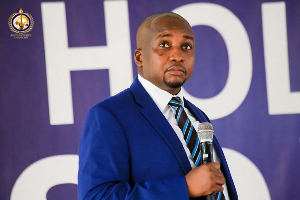At the People's Assembly held at Cape Coast last Tuesday, His Excellency President John Agyekum Kufuor, promised the people of the region that a stadium is to be constructed there, to augment those earmarked for the hosting of the 2008 African Cup of Nations.
The potential for increase in business and job opportunities was also raised. Last Wednesday, February 8, 2006 we carried the story about the construction of the Sekondi stadium, one of the venues for the hosting of the 2008 continental tournament.
What came out of the rumours and established by The Chronicle follow-up investigations about the recruitments for the construction work, was that expatriate Chinese workers have been flown in as part of the labour force.
It is not strange to have companies undertaking contracts outside their home countries to send along some of their regular staff. This is generally provided for in agreements awarding the contracts to such companies.
The provision, however, invariably enjoins these companies to recruit as many of the general workforce from the area where the work is to be executed, except in cases where the expertise required was not available in the country.
When Ghana won the bid to host the Nations' Cup, hopes were high and we started counting the dividends to include job opportunities at the construction phase.
The Chronicle therefore finds it strange that out of the sixty workers brought in by Shanghai Group of Companies, the contractors engaged in the Sekondi stadium construction, are many unskilled workers, undertaking simple aspects of the construction work that many Ghanaians can do.
It is our belief that it is not for naught that the important clause of restricting the quality of labour to be sent across borders by companies are inserted in contracts.
Beyond not meeting the job expectations of the unemployed artisans and unskilled workers that such major contract awards bring, the economic implications could also not be lost to anybody.
One of the banes of Africa's development is the perpetual problem of high indebtedness hanging around the necks of countries.
Even though the continent's leaders and other advocates have mostly blamed the problem on the unfair world trade order, the inappropriate utilization of the revenue from such trade and use of loans have led to capital flight, thereby perpetuating the situation.
The system where substantial part of the loans we contract is spent on paying for foreign consultants and other expatriate workers, who repatriate their earnings, spells double jeopardy for us, as the non-expenditure of these earnings in our economy makes us all the more poorer.
The laws of the country are adequate to protect the national interest. The national interest would however not be protected if we decided not to enforce our laws, by allowing people to flout these laws with impunity.
As was evident in the story on the Sekondi stadium construction recruitment, the contractors are bent on bringing down more of persons they claim are their workers.
It is up to us to decide, to either allow a free-for-all access to our labour market or work at securing the interests of the Ghanaian on the labour market.
The teeming unemployed youth of Sekondi, who had high hopes of getting employed, at least during the tenure of the construction, seeing the Chinese take over the work, must be wandering: where are the jobs promised us?!
Editorial News of Saturday, 11 February 2006
Source: Ghanaian Chronicle (
EDITORIAL: Where Are the Jobs Promised?
Entertainment











